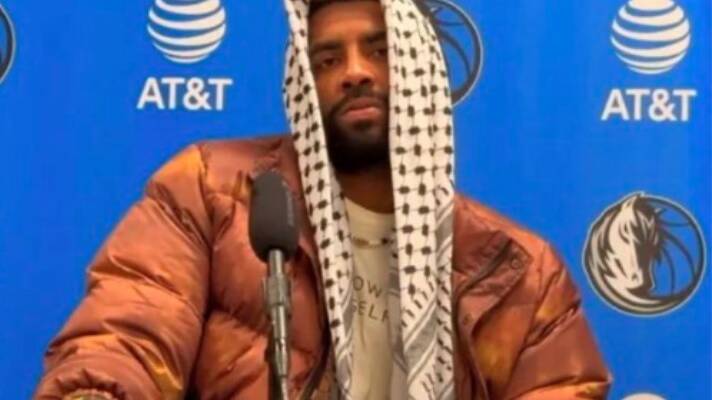NBA star Kyrie Irving saw the sign and said there’s ‘no need to bring that to a game.’
A group of Utah rabbis were told to remove signs that read “I’m a Jew and I’m proud” from a professional basketball game on Monday night because they were distracting the players.
Rabbi Avremi Zippel and three other rabbis brought the signs to the Delta Center to watch the home-team Utah Jazz face the Dallas Mavericks. The signs were meant to protest Kyrie Irving, now a Mavericks player, who was suspended in 2022 by a former team for tweeting a link to a movie widely considered to be antisemitic. He initially refused to disavow the film.
We may have brought four Rabbis to sit courtside tonight… pic.twitter.com/mRzPPUoOZf
— Avremi Zippel (@UtahRabbi) January 2, 2024
Zippel wrote on X/Twitter that Irving saw the signs early in the first quarter and told him: “No need to bring that to a game.” According to the rabbi, Irving then spoke to Mavericks security staff, before Jazz officials appeared to check the rabbis’ tickets and tell them to remove the signs.
The Jazz said in a statement that the signs violated its code of conduct for those at the arena, which the team explained is meant so that games can be played “without distraction and disruption.”
Regardless of where someone is in the arena, the team continued, “if a sign becomes distracting or sparks an interaction with a player, we will ask them to remove it.”
“During an out-of-bounds play in the first quarter of yesterday’s Jazz game against the Dallas Mavericks, there was a group sitting courtside whose signs sparked an interaction with a player that created a distraction and interfered with the play of game,” the statement read. “As the next step in standard security protocol, the fans were asked to take down their signs.”
The Jazz added that a “part-time employee” who told the rabbis that the content of the signs was problematic was “incorrect.”
“The issue was the disruptive interaction caused by usage of the signs, not the content of the signs,” the statement concluded.
However, Zippel argued on X/Twitter on Tuesday that the Jazz took Irving’s side.
“Bottom line: there was one person, in a building of 18,000+, that was triggered by sign that says ‘I’m a Jew and I’m proud,’ Why that bothers him so, to the point that it sparks an interaction, should be the real question anyone is asking,” Zippel wrote. “Sadly, instead of just quietly chalking this up to a misunderstanding and letting this remain a small blip, the Jazz took the side of said triggered player and doubled down. That’s just disappointing to me.”
Zippel, who noted he will remain a supporter of the Jazz, told the Deseret News that the NBA team has over the years shown strong support for the local Jewish community.
The Jazz beat the Mavericks 127-90 on Monday.
In November, Irving stirred controversy by wearing a black and white keffiyeh, a traditional headscarf worn in the Middle East that has become known as a symbol of solidarity with the Palestinians against Israel. He also posted a photo on Instagram of himself wearing the headscarf as he walked around the Martin Luther King Jr. memorial in Washington, DC, and accepted a Palestinian flag as a gift from a basketball fan at a recent game.
Irving’s decision to wear a keffiyeh garnered significant attention on social media, with pro-Israel supporters lambasting him for doing so amid Israel’s ongoing war with Hamas following the Palestinian terror group’s Oct. 7 massacre in southern Israel. The onslaught was the biggest single-day slaughter of Jews since the Holocaust.
Since Oct. 7, Irving has shared pro-Palestinian messages on social media. The athlete — who likes to go by his Native American name “Hélà” online — has more than once reposted tweets about genocide and “crimes of the empire,” seemingly referring to Israel, by an account on X/Twitter called “End All Colonialism, Free Palestine.” He also shared messages about the US funding Israel’s alleged “genocidal massacre” in the Gaza Strip.
This was not the first time that Irving embroiled himself in a controversy involving accusations of antisemitism.
In Oct. 2022, while playing for the Brooklyn Nets, Irving tweeted a link to a film that promoted antisemitic disinformation, including conspiracy theories and Holocaust denial. The Brooklyn Nets suspended him for five games when he did not immediately apologize — and even defended himself — for sharing the movie and failing to “disavow antisemitism when given a clear opportunity to do so.”
The NBA star later apologized on Instagram for sharing details about a film that “contained some false antisemitic statements, narratives, and language that were untrue and offensive to the Jewish Race/Religion.” He said he opposed all forms of hatred and would donate $500,000 toward organizations that combat hate. It was then reported in February that he deleted the Instagram apology.
The Anti-Defamation League rejected Irving’s donation of $500,000, and Nike severed its commercial ties with the NBA star.
Antisemitic incidents have skyrocketed across the US since the Hamas atrocities of Oct. 7.
